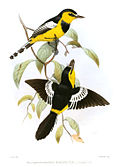Pitohui (genus)
| Pitohui | |
|---|---|

| |
| Hooded pitohui (Pitohui dichrous) | |
| Scientific classification | |
| Domain: | Eukaryota |
| Kingdom: | Animalia |
| Phylum: | Chordata |
| Class: | Aves |
| Order: | Passeriformes |
| Family: | Oriolidae |
| Genus: | Pitohui Lesson, 1831 |
| Type species | |
| Lanius kirhocephalus (Northern variable pitohui) | |
| Species | |
|
See text. | |
| Synonyms | |
| |
Pitohui is a genus of birds endemic to New Guinea. The birds formerly lumped together as pitohuis were found by a 2008 study that examined their evolutionary history on the basis of the genetic sequences to have included birds that were quite unrelated to each other. They have since been separated into other genera.
Taxonomy and systematics
[edit]The genus Pitohui was introduced in 1831 by the French naturalist René Lesson.[1] Lesson omitted to specify the type species but this was designated as the northern variable pitohui by Richard Bowdler Sharpe in 1877.[2][3] The genus name is a Papuan word for the variable pitohui.[4]
The common group name pitohui includes several species of birds that were all historically classified in the genus Pitohui. But now they have been separated into three families and multiple genera. The genus Pitohui in its strict sense is now placed in the family Oriolidae, while the other pitohui genera have been placed in the families Oreoicidae and Pachycephalidae.[5][6]
Species
[edit]Four species are recognized in the revised genus Pitouhi:[7]
| Image | Common Name | Scientific name | Distribution |
|---|---|---|---|
| Northern variable pitohui | Pitohui kirhocephalus | New Guinea | |
| Raja Ampat pitohui | Pitohui cerviniventris | western Papuan Islands of New Guinea. | |
| Southern variable pitohui | Pitohui uropygialis | New Guinea | |
 |
Hooded pitohui | Pitohui dichrous | New Guinea. |
Former species
[edit]Species that were formerly sometimes placed in the genus Pitohui include the following:
- Crested pitohui (Ornorectes cristatus, Family Oreoicidae, formerly placed as Pitohui cristatus)[8]
- Black pitohui (Melanorectes nigrescens, Family Pachycephalidae, formerly placed as Pitohui nigrescens)[9]
- White-bellied pitohui (Pseudorectes incertus, Family Pachycephalidae, formerly placed as Pitohui incertus)[10]
- Rusty pitohui (Pseudorectes ferrugineus, Family Pachycephalidae, formerly placed as Pitohui ferrugineus)[11]
- Morningbird (Pachycephala tenebrosa, Family Pachycephalidae, formerly placed as Pitohui tenebrosus or as Colluricincla tenebrosa)[12]
References
[edit]- ^ Lesson, René (1831). Traité d'Ornithologie, ou Tableau Méthodique (in French). Paris: F.G. Levrault. p. 375, livraison 5. Published in 8 livraisons between 1830 and 1831. For the date see: Dickinson, E.C.; Overstreet, L.K.; Dowsett, R.J.; Bruce, M.D. (2011). Priority! The Dating of Scientific Names in Ornithology: a Directory to the literature and its reviewers. Northampton, UK: Aves Press. p. 119. ISBN 978-0-9568611-1-5.
- ^ Sharpe, R. Bowdler (1877). Catalogue of the Passeriformes or Perching Birds in the Collection of the British Museum. Coliomorphae. Catalogue of the Birds in the British Museum. Vol. 3. London: Trustees of the British Museum. p. 283.
- ^ Paynter, Raymond A. Jr, ed. (1986). Check-List of Birds of the World. Vol. 12. Cambridge, Massachusetts: Museum of Comparative Zoology. p. 45.
- ^ Jobling, James A. (2010). The Helm Dictionary of Scientific Bird Names. London: Christopher Helm. p. 308. ISBN 978-1-4081-2501-4.
- ^ Dumbacher, J; Deiner, K; Thompson, L; Fleischer, R (2008). "Phylogeny of the avian genus Pitohui and the evolution of toxicity in birds". Molecular Phylogenetics and Evolution. 49 (3): 774–781. Bibcode:2008MolPE..49..774D. doi:10.1016/j.ympev.2008.09.018. PMID 18929671.
- ^ Dumbacher, John P. (2014). "A taxonomic revision of the genus Pitohui Lesson, 1831 (Oriolidae), with historical notes on names" (PDF). Bull.B.O.C. 134 (1): 19–22.
- ^ Gill, Frank; Donsker, David; Rasmussen, Pamela, eds. (January 2021). "Orioles, drongos, fantails". IOC World Bird List Version 11.1. International Ornithologists' Union. Retrieved 2 July 2021.
- ^ "Ornorectes cristatus - Avibase". avibase.bsc-eoc.org. Retrieved 2017-01-30.
- ^ "Melanorectes nigrescens - Avibase". avibase.bsc-eoc.org. Retrieved 2017-01-30.
- ^ "Pseudorectes incertus - Avibase". avibase.bsc-eoc.org. Retrieved 2017-01-30.
- ^ "Pseudorectes ferrugineus - Avibase". avibase.bsc-eoc.org. Retrieved 2017-01-30.
- ^ "Pachycephala tenebrosa - Avibase". avibase.bsc-eoc.org. Retrieved 2017-02-13.








